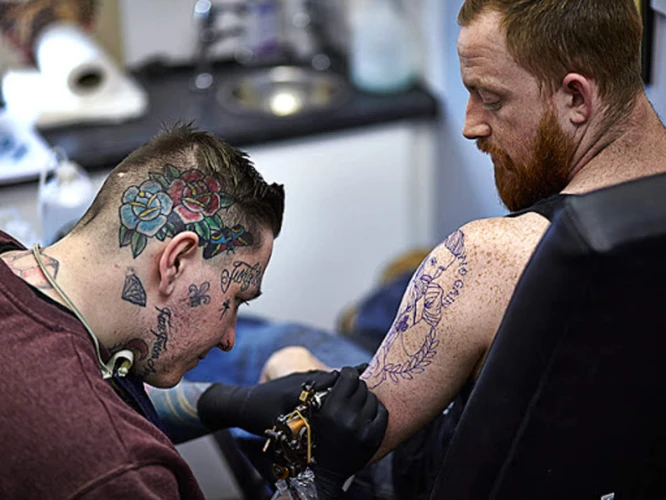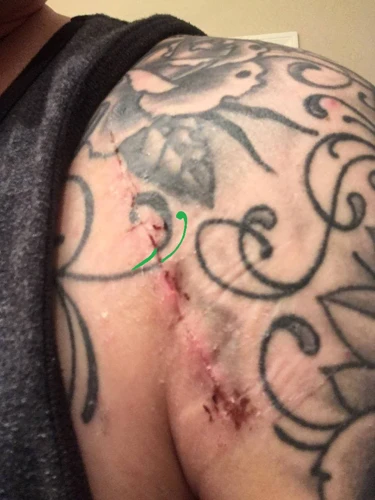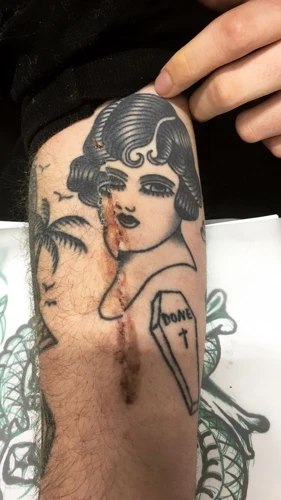Are you considering getting a tattoo after surgery? If so, you may be wondering “How soon after surgery can I get a tattoo?”. Depending on the type of surgery, the healing process can vary from person to person. In this article, we will discuss the factors that you should consider before getting a tattoo after surgery, as well as provide tips for the safest and most effective tattooing experience. Read on to find out more about when you can safely get a tattoo after surgery.
Contents
Background Information

What is a Tattoo?
A tattoo is a form of body modification where a design is made by inserting ink, dyes and pigments, either indelible or temporary, into the dermis layer of the skin to change the pigment. Tattoos fall into three broad categories: purely decorative (with no specific meaning); symbolic (with a specific meaning pertinent to the wearer); and pictorial (a depictive style in which an image is presented).
Different Types of Tattoos
The most common types of tattoos are black and grey, color, portrait, watercolor, and 3D. Black and grey tattoos are the most traditional and consist of solid black lines and shades. Color tattoos are vibrant and may use a wide range of colors to create a unique design. Portrait tattoos are highly detailed, realistic designs that capture a subject’s features. Watercolor tattoos are vibrant, brushstroke designs that look like a painting. 3D tattoos are very intricate and realistic, creating a three-dimensional look.
Health Risks Associated with Tattooing
Tattooing can carry a risk of infection and other complications. Prior to getting a tattoo, it is important to make sure the person performing the procedure is a licensed, experienced professional. Before getting a tattoo, it is important to consider the potential health risks, such as allergic reactions, skin infections, and blood-borne diseases. Additionally, getting a tattoo soon after surgery can be dangerous, as the area may still be healing and susceptible to infection. Therefore, it is important to consult with a medical professional before getting a tattoo after surgery to ensure it is safe.
How Soon After Surgery Can I Get a Tattoo?

Getting a tattoo can be a great way to express yourself and commemorate an important event in your life. But if you have recently had surgery, you might be wondering if it’s safe to get a tattoo. The answer depends on factors such as the type of surgery you had and the size and location of your tattoo.
Factors to Consider Before Getting a Tattoo
When considering getting a tattoo after surgery, you should consider a few factors. First, you need to find out what type of surgery you had. Different surgeries carry different risks and require different amounts of time to heal. For example, a major surgery such as a hip replacement may require more time to heal than a minor surgery such as a mole removal. It is also important to consider the size and location of your tattoo. A small tattoo located in an area that hasn’t been affected by surgery may be easier to heal than a large tattoo located in the area of the surgery.
Time it Takes for a Surgical Wound to Heal
The amount of time it takes for a surgical wound to heal will depend on several factors, including the type of surgery and the size of the wound. Generally, small wounds take around two weeks to heal. Larger wounds may take up to six weeks to heal. It is important to follow your doctor’s instructions and allow your wound to heal completely before getting a tattoo.
Guidelines for Tattooing After Surgery
When considering getting a tattoo after surgery, it is important to follow the guidelines set by your doctor. Your doctor will likely advise you to wait at least six weeks before getting a tattoo, as this is the amount of time it takes for most surgical wounds to heal. Additionally, your doctor may ask you to wait until the scar has healed completely.
It is also important to take precautions when getting a tattoo after surgery. Make sure to use a clean, sterile tattoo needle, and follow all safety guidelines. Additionally, it is important to use a high-quality tattoo ink, as this will help reduce the risk of infection.
Getting a tattoo after surgery is possible, but it is important to consider the risks and take the necessary precautions. Before getting a tattoo, be sure to talk to your doctor to ensure that your wound has healed properly and that it is safe to get a tattoo.
How Long After a Tattoo Can You Have Surgery?

Getting a tattoo before surgery can be risky and can even lead to a worse outcome after the procedure. It is important to understand the potential risks and take proper precautions when considering getting a tattoo before surgery.
Risks of Getting a Tattoo Before Surgery
Getting a tattoo before surgery can increase the risk of infection, as it introduces foreign material into the body. This can potentially lead to a weakened immune system, which can make it more difficult for the body to recover from the surgery. Additionally, the process of getting a tattoo can introduce bacteria into the skin, increasing the risk of infection and potentially delaying the healing process.
Precautions to Take Before Surgery
If you are considering getting a tattoo before surgery, it is important to speak to your healthcare provider first. They will be able to provide guidance on the best way to ensure that your tattoo is safe and will not increase the risk of complications from the surgery. Additionally, it is important to ensure that the tattoo parlor is reputable and that all equipment used is sterile and properly maintained.
Waiting Period After Getting a Tattoo Before Surgery
It is generally recommended to wait at least four to six weeks after getting a tattoo before undergoing surgery. This is to allow enough time for the healing process to take place and for the body to adjust to the new tattoo. During this waiting period, it is important to take extra care of the tattooed area and to keep it clean and dry. Additionally, if any redness or irritation occurs, it is important to seek medical advice.
Pros and Cons of Getting a Tattoo After Surgery
Pros
- Getting a tattoo after surgery can help in the healing process. Since tattoos are created by creating small injuries in the skin, they can help to create a protective layer which can help the wound heal faster.
- Getting a tattoo after surgery may also provide a form of pain relief from the surgery. Tattoos can help to distract from the pain of the surgery and can also provide a sense of relaxation.
- Getting a tattoo after surgery can also be a way to express oneself after a surgery. It can be a way to commemorate the experience and to show off your strength and resilience.
Cons
- Getting a tattoo after surgery can cause complications. Since the skin is already damaged, the tattoo can irritate the area and cause an infection. It is important to wait until the wound has healed completely before getting a tattoo.
- Getting a tattoo after surgery can also be painful. Since the area is already sensitive, the tattooing process can be even more uncomfortable than usual.
- Getting a tattoo after surgery can also interfere with the healing process. The process of tattooing can create more trauma to the area and can delay healing time.
Frequently Asked Questions
How Soon After Surgery Can I Get a Tattoo?
It is not recommended to get a tattoo immediately after surgery, as your body is still healing and the area may be prone to infection. It is best to wait at least 6-8 weeks after surgery before getting a tattoo. However, if you are getting a tattoo in a location that was not affected by the surgery, you may be able to get it sooner. Be sure to consult with your doctor before getting a tattoo to ensure it is safe for you.
Are there any health risks associated with getting a tattoo soon after surgery?
Getting a tattoo soon after surgery could potentially put you at risk for infection and other complications. This is due to the fact that your body has not had enough time to heal, and the process of tattooing can increase your risk of infection. Additionally, the trauma caused by the tattooing process can further damage any existing scar tissue, leading to further complications with your healing process. Therefore, it is advisable to wait until you are fully healed before getting a tattoo.
Are There Any Specific Rules I Should Follow When Getting a Tattoo After Surgery?
Wait: The most important rule to follow when getting a tattoo after surgery is to wait at least 6-8 weeks before getting a tattoo. This will give your body enough time to heal and reduce the risk of infection. Choose a Tattoo Artist: Make sure to find an experienced and reputable tattoo artist who uses safe and sterile practices. Ask to see their certificates and portfolio, and make sure the artist is up-to-date on all safety regulations. Cleanliness: Be sure to keep the area clean and hygienic before and after the tattoo process. Keep the area covered with a bandage for the first few days and make sure to wash your hands before and after each application. Aftercare: Follow the tattoo artist’s instructions for aftercare. This may include keeping the area clean, using a moisturizer or ointment to keep it moisturized, avoiding direct sunlight, and avoiding any activities that cause excessive sweating.
What kind of aftercare is recommended for tattoos done soon after surgery?
For tattoos done soon after surgery, it is recommended to keep the area bandaged for a few hours and to clean with mild soap and warm water several times a day. Avoid soaking in a bath or swimming pool, and use a light moisturizer to keep the tattooed area hydrated. Avoid direct sunlight and heat, and contact your doctor if you experience increased redness, swelling, or pain.
Will I need to wait for a certain period of time before getting a tattoo after surgery?
- Tattoo ink can interfere with the healing process – Tattoo ink can cause inflammation and interfere with the healing process, so it is important to wait until after the surgery has healed before getting a tattoo.
- Wound care is important – After surgery, it is important to take proper care of the wound in order to ensure proper healing. This includes keeping the wound clean, using a sterile dressing, and avoiding any activities that could cause trauma to the wound.
- Wait for the skin to fully recover – It is important to wait until the skin has fully recovered from the surgery before getting a tattoo. Generally, this will be several weeks after the surgery. However, it is important to follow the advice of your doctor as they will be able to give you the best advice on when it is safe to get a tattoo.
Conclusion
It is important to consult a doctor before getting a tattoo after surgery to ensure that it is safe for your body. The length of time to wait for a tattoo after surgery will depend on the type and complexity of the surgery and the healing progress. In general, it is recommended to wait at least a few months to ensure that the surgery wound has healed completely and that the body has sufficient time to recover.